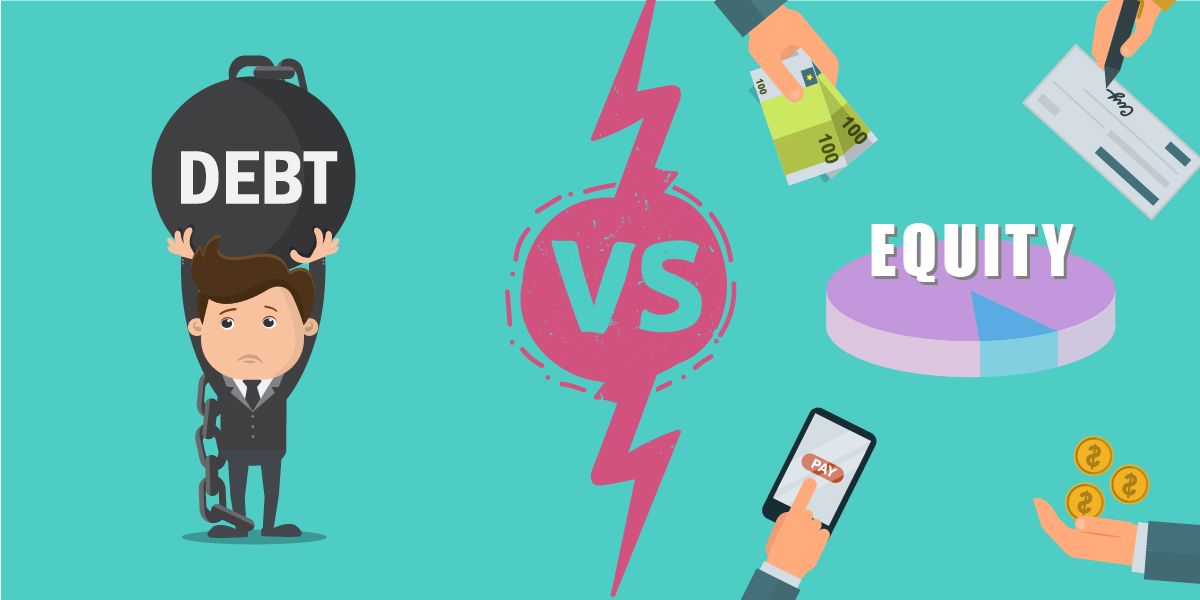From Risk to Reward: Understanding the Impact of Debt vs. Equity Financing on Your Business
Choosing how to get money for your business is a big deal because it can change how your business grows and succeeds. Think of it like choosing between borrowing money from a friend or giving them a part of your lemonade stand in exchange for their help. Both ways can help you get more lemons and cups but they work differently. Borrowing money (we call this debt financing) means you must repay your friend over time with a little extra as a thank you. But your lemonade stand is still all yours. On the other hand giving them a part of your stand (equity financing) means you don't owe them money later but you'll have to share what you earn from selling lemonade.
It's essential to consider which choice is better for your lemonade stand. Is repaying a debt more important to you than splitting your earnings? And remember how much money you spend or make can also change because of different rules about money (tax implications).
That's where Trusted10.io comes in. We're like the wise neighbor who knows a lot about lemonade stands. We can help you find the best way to get more lemons and cups so your stand performs well. This blog is like a friendly chat with us where we share Business growth strategies and what we know about borrowing money or sharing your stand to help you make the best choice for your lemonade business.
Understanding Debt Financing
When businesses need extra money to grow or handle day-to-day expenses one popular choice is debt financing. It's like getting a loan where you borrow money and agree to pay it back later plus a little extra for the favor. This "extra" is called interest. Here's a closer look at how debt financing works and what it means for a business.
What It Is and How It Works
Debt financing means a business gets money from a bank or another place that lends money. But this cash won't come cheap. The interest or cost of borrowing must be repaid by the corporation in installments. Sometimes the lender asks for something valuable (like property) as a safety promise called collateral. The lender can take the security to make up for the loss if the business can't pay back the loan. Loans can be short (like a quick fix) or long (for big plans).
The Good Stuff
One of the cool things about debt financing is that the interest you pay on the loan can often reduce your taxes saving you money. A loan with a set interest rate also makes budgeting simpler since you know the precise amount you'll have to pay back each month.
The Not-So-Good Stuff
But there are downsides too. The biggest one is that you must keep paying back the loan regularly which can be challenging especially if your business hits a rough patch. If a company borrows too much and can't pay it back it might have to declare bankruptcy. In this severe situation it might have to shut down or get help to pay off its debts.
Different Kinds of Debt Financing
There are a few ways businesses can borrow money. They might get a loan from a bank which is a common way to get a big chunk of money all at once. Or they might issue bonds which is a way of getting lots of people to lend them small amounts of money and then the business pays back all these people over time with interest.
Understanding debt financing is vital for businesses to make intelligent choices about how to get and use borrowed money. It's all about balancing the benefits like tax breaks and fixed payments with the risks like the pressure to repay the loan and the danger of borrowing too much.

Understanding Equity Financing
When a business needs money to grow or start new projects equity financing is one way to get that funding. This extends an invitation to purchase a little stake in your business. You get the cash you need from them as compensation. Let's dive into what equity financing means and how it works.
What is Equity Financing?
To raise capital via equity financing you must offer investors a stake in your firm in the form of shares. These investors give you money and they get a part of your company's ownership in return. Here's what happens with equity financing:
- Ownership: When investors give you money they become part-owners of your company.
- No need to pay back: Unlike a loan you don't have to repay this monthly. There's no interest either.
- Sharing the highs and lows: Investors are on this journey with you. When the business is successful they also succeed. But if things don't go great they share the risk too.
The Good Stuff about Equity Financing
Choosing equity financing can be helpful because:
- Cash flow friendly: Being free from monthly payments is great for your cash flow.
- Considerable potential: Investors can bring in a lot of money which can help your business grow big.
The Not-so-Good Stuff
However equity financing has its downsides too:
- Sharing control: When you sell part of your company you must also share decision-making power. This means you might be one of many calling the shots.
- Less pie to share: The more shares you sell the smaller your piece of the company becomes. This is called dilution.
Different Ways to Get Equity Financing
You can get stock funding in a number of ways such as:
- Venture Capital: This is when big investors like venture capital firms give you money for a part of your company. They usually do this for startups or young companies they believe will grow fast.
- Going Public: A business may choose to sell shares to anyone who wants them. An IPO is a way to get a lot of money.
Equity financing is a big decision because it involves giving up a part of your company. But for many companies it's a great way to get the money they need to make their big plans come true.
Tax Implications Of Debt Vs. Equity Financing
When it comes to funding your business it's about more than just getting the money. It would help if you also thought about how it affects your taxes. Let's break down the tax implications for debt and equity financing to see how they impact your business.
Debt Financing and Taxes
Borrowing money can have some perks come tax time:
- Tax Deductible Interest: The interest you pay on borrowed money can be deducted from your income when calculating your taxes. This can lower the income you're taxed on which might save you money.
- Less Taxes to Pay: You may end up paying less in taxes due to the interest deduction. This can help your business keep more cash on hand.
Equity Financing and Taxes
Getting investment in exchange for ownership is a bit different:
- Capital Gains: If your investors sell their part of the company later and it's worth more they might have to pay taxes on the profit known as capital gains tax.
- Dividends: If your company pays out profits to shareholders (like dividends) those payments are taxed. The company doesn't get a tax break on them and the people receiving them must also pay taxes.
Comparing the Two
When deciding between debt and equity financing think about:
- Balancing Act: Loans can give you a tax break on interest but you must repay the borrowed money. You might not have to pay back the funds with investors but you're sharing your profits and possibly some control.
- Money Now Taxes Later: The interest tax break from loans might help your cash flow now. But with equity you might deal with taxes related to capital gains or dividends later.
Choosing between debt and equity financing isn't just about the money you get; it's also about how it affects your taxes and cash flow. You can make a better decision for the future of your business if you know about these tax effects.\

Business Considerations
Choosing how to get money for your business is like planning a big trip. You've got to think about getting from point A to point B and what you'll encounter along the way. Here's a simple guide to help you decide between borrowing money (debt financing) or getting investors (equity financing):
Where's Your Business At?
- Starting (Startups): If your business is brand new like a little sapling you should go with investors. This way you don't have to worry about paying back a loan immediately and can focus on growing your business.
- Been Around (Established Businesses): If your business is more like a sturdy tree steady and robust borrowing might be better. You can get the money you need based on what your company already has and keep complete control.
What's Going On In Your Business World?
- Up and Down Industries: If your business is in an area that has lots of good times and challenging times like a roller coaster borrowing might help you keep things steady.
- Fast-Growing Fields: If you're in a super-fast-growing area like technology getting investors could give your business a big push to grow even faster.
What Are You Hoping To Do?
- Quick Goals: If you've got something you want to do soon borrowing might be the way. The amount and due date for repayment will be clearly communicated to you.
- Big Plans: Getting investors can give you more room to move and grow if you're dreaming big and looking at long-term projects.
How Much Risk Feels Okay?
- Keeping It Safe: Borrowing is more comfortable if you like to keep things safe and predictable. You'll know the rules and what you owe.
- Ready for Adventure: If you're okay with a bit of risk for the chance of big rewards sharing your business with investors might be exciting. You and your investors will be in it together for better or worse.
Important Rules
- Taxes and Stuff: Borrowing has some tax perks like being able to deduct what you pay in interest. But with investors you've got to think about different tax stuff like how profits are shared and taxed.
- Sticking to the Rules: Whether you borrow money or bring in investors there are rules to follow. Ensure you understand what's needed so you don't hit any bumps.
These points can help you choose the best way to get money for your business like picking the right path for your trip. The key is to figure out what works best for your company and how you want to expand.
Conclusion
Debt finance and equity financing are two methods we covered in this blog post on raising capital for a company. Borrowing money means paying it back later with a little extra but you control your business ultimately. Finding investors means you get money without paying it before but you share your business with them. We also examined how these choices affect your taxes and why thinking about what's best for your business is crucial.
Choosing between borrowing money or getting investors is a big decision. The success of one company does not guarantee the same level of success for another. Choosing the appropriate instrument for a task is analogous. Think about your future goals your comfort level and the demands of your company.
Trusted10.io is here to help you understand all this. We want to make these tricky ideas easy to get so you can make intelligent choices for your business. It's always a good idea to talk to experts and keep up with new tips and info in the business world. It has lots of resources and expert advice to help guide you so you can grow your business in the best way possible.
